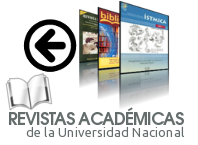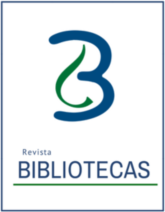Didactic Strategy for the Curricular Integration of the Library: Creation of Projects with Arduino and Scratch
Didactic Strategy for the Curricular Integration of the Library: Creation of Projects with Arduino and Scratch
DOI:
https://doi.org/10.15359/rb.40-1.4Keywords:
Educational technology, Innovation, Arduino, Scratch, Pedagogical planning, Curriculum integration, Makerspace, LibrariesAbstract
The free software and hardware movement has socialized the technology allowing open access to it and thereby reducing the digital divide. In the classroom the opportunity has been found in these movements to boost classes and teaching and learning processes in general, however, the library has a preponderant role in such dynamization, because this space for the promotion of information can offer staff Teaching technology tools and knowledge of them for use through curriculum integration and pedagogical planning. This article shows the execution of a didactic strategy that teaches future professionals in library science to create projects for the curricular integration of their information units using Scratch software and Arduino microprocessors to support pedagogical planning. It also shows the projects that the students developed in said strategy and their opinion in the whole teaching and learning process experienced.
References
Altuve, D. (2016). La formación docente en el proceso de la planificación pedagógica. Educ@ción en Contexto. 2, 129-145. https://bit.ly/3sSGVD7
Castrillo-Sequeira, R. y Méndez-Molina, M. (2015). Integración de la Biblioteca de la Escuela La Trinidad, Moravia (San José, Costa Rica) al currículo escolar y a la comunidad educativa. [tesis licenciatura, Universidad Nacional de Costa Rica]. Repositorio UNA. https://bit.ly/3gEHtHE
Cobo, G y Valdivia, S. (2017). Aprendizaje Basado en Proyectos. Instituto de Docencia Universitaria (PUCP).https://bit.ly/3mG4VrL
Correa, M., y Pablos, J. (2009). Nuevas Tecnologías e innovación educativa. Revista de Psicodidáctica, 14(1), 133-145.https://bit.ly/3sULDzY
Díaz, F. (2015). Estrategias para el desarrollo de competencias en educación superior. En: Carrillo Mendoza, Gabriela (Ed), I Encuentro Internacional Universitario. El currículo por competencias en la educación superior. Ponencias y debate (pp.63-86).Pontificia Universidad Católica del Perú.
Herrero-Herranz, J. y Sánchez-Allende, J. (2015). Una mirada al mundo Arduino. Revista de Ciencia, Tecnología y Medio Ambiente, (13), 3-28. https://revistas.uax.es/index.php/tec_des/article/download/617/573
Margalef, L y Arenas, A. (2006). ¿Qué entendemos por innovación educativa? A propósito del desarrollo curricular. Perspectiva Educacional, Formación de Profesores, (47), 13-31. https://bit.ly/2WvjKCL
Martí, A; Heydrich, M; Rojas, M y Hernández, A. (2010). Aprendizaje basado en proyectos: una experiencia de innovación docente. Revista Universidad EAFIT, 46(158), 11-21. https://bit.ly/38i7po2
Michavila, F. (2009). La innovación educativa: Oportunidades y barreras. Revista Arbor ciencia, pensamiento y cultura. https://doi.org/10.3989/arbor.2009.extran1201
Novillo-Vicuña, J. et al. (2018). Arduino y el Internet de las Cosas. Alicante: Editorial Área de Innovación y Desarrollo. http://doi.org/10.17993/IngyTec.2018.45
Orera-Orera, L. (2008). Reflexiones sobre el concepto de biblioteca. Saberes compartidos, (2), 20-31. https://bit.ly/3gGtwJl
Paau-Cho, M.R. (2009). Viviendo el futuro en el aula: las tecnologías de la información y comunicación en los procesos de aprendizaje en la escuela primaria o básica. San José, Costa Rica: Coordinación Educativa y Cultural Centroamericana. https://bit.ly/3yw3zT2
Paredes, J; Guitert; M y Rubia, B. (2015). La innovación y la tecnología educativa como base de la formación inicial del profesorado para la renovación de la enseñanza. Revista Latinoamericana de Tecnología Educativa, 14(1), 101-114. https://bit.ly/2WwzANg
Pritchard, S.M. (2014). Building Institutions of Knowledge: librarianship as makerspace.Libraries and the Academy, 14(4), 471-473. https://doi.org/10.1353/pla.2014.0030
Randi, J. y Corno, L. (2000). Los profesores corno innovadores.En Goodson, I.F., Good, T. y Biddle, B.J. (Coord.), La enseñanza y los profesores (pp. 169-236). Paidós.
Rodríguez, E., Vargas, É. y Luna, J. (2010). Evaluación de la estrategia "aprendizaje basado en proyectos". Revista Educación y Educadores, 13(1), 13-25. https://bit.ly/3zliZKV
Sancho, J. M. y Alonso-Cano, C. (Coord.) (2012). La fugacidad de las políticas, la inercia de las prácticas: la educación y las tecnologías de la información y la comunicación. Octaedro.
Seas-Tencio, J. (2016). Didáctica General I. EUNED.
Sheehy, K., Ferguson, R., y Clough, G. (2014). Augmented Education: Bringing Real and Virtual Learning Together (Digital Education and Learning). Palgrave Macmillan.
Stallman, R. (2004). Software libre para una sociedad libre. Editorial Traficantes de Sueños.
Tellez-Ramírez, M. (2016). Incursión de la robótica en la educación. Investigación y tecnología, 4(2), 41-52. https://bit.ly/3DqFOPW
Valverde-Berrocoso, J., Fernández-Sánchez, M.R. y Garrido-Arroyo, M.C. (2015). El pensamiento computacional y las nuevas ecologías del aprendizaje. RED – Revista de Educación a Distancia, 46(3), 1-18. https://bit.ly/38iIZuw
Valverde-Chavarría, J. (2005). Software libre, alternativa tecnológica para la educación. Revista Electrónica “Actualidades Investigativas en Educación”, 5(2), 1-9. https://bit.ly/3BkWzdn
Willging, P., Astudillo, G. y Bast, P. (2010). Aprender a programar (¿y a pensar?) jugando. https://bit.ly/2Y7mVRN
Yockey, M. y Donovan, M.A. (2015). Maker Spaces. Illinois Reading Council Journal, 43(3), 56-60.
Zaltman, G; Duncan, R. y IIolbek, J. (1973). Innovations and Organizations. J. Wiley & Sons.
Downloads
Published
How to Cite
Issue
Section
License
Bibliotecas provide immediate open access to their content, based on the principle of facilitating research to the public free of charge and free of charge to promote the global exchange of knowledge.
The journal Bibliotecas is a publication hosted by a public higher education institution, which is supported by public resources. Since its inception, the magazine has offered all its contents free of charge without any restriction on the rights of: reading, downloading and printing in full text. Works published in libraries may be analyzed, quoted and reproduced in whole or in part, mentioning the original source.
The journal Bibliotecas is licensed under the Creative Commons Attribution - Non-Commercial - Share Equal, 4.0 International license; therefore, it is allowed to: share, copy and redistribute the material in any medium or format.

Este obra está bajo una licencia Creative Commons Atribución-NoComercial-CompartirIgual 4.0 Internacional.








